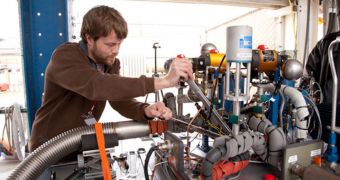Investigators from the United Launch Alliance (ULA) and XCOR Aerospace, two key players in the private space industry, announced recently that they managed to create a piston pump that can function for liquid hydrogen. Previous investigations conducted last year showed that operations conducted with such pumps and high performance cryogenic (liquid oxygen and liquid nitrogen) were possible, but the new investigation takes that up a notch, by demonstrating that the liquid hydrogen version is possible as well. The piston pumps that the companies develop are an alternative to the commonly-used turbopumps that go on rockets, and they have been in design for eight years, Space Fellowship reports.
XCOR Aerospace is more commonly known in the space industry for being the company that developed the Lynx manned suborbital vehicle, as well as a large number of the technologies that make this possible. Researchers here worked in close collaboration with scientists at the Colorado-based United Launch Alliance, which is basically a joint venture of Lockheed Martin and Boeing, The ULA has been the principal launch service provider for the United States and its Government for many years. One of the reasons that these two companies decided to work together was to improve the existing pump designs by as much as possible.
These instruments can already operate over a wide range of speeds and inlet conditions, but the XCOR/ULA team wanted to extend those limits even further. “XCOR has demonstrated the beginnings of an important technology development path that has the promise to significantly improve the competitiveness of future ULA launch vehicles,” says Dr. George Sowers, who is the vice-president of Business Development and Advanced Programs at the ULA. “XCOR is doing things with piston pumps that no one else has done,” adds Alliance Advanced Programs group senior staff engineer Frank Zegler.
“ULA has taken a very innovative and commercially focused approach for future technology insertion into their long range product planning roadmap, and XCOR is very pleased to support the ULA team by further enhancing and extending our technology to their unique needs for lower cost launch vehicles, new on-orbit applications and capabilities, and future deep space exploration systems,” concludes Jeff Greason, who is both the president and founder of XCOR.
“ULA’s use of our high performance, light weight cryogenic piston pump technology is very exciting and this effort is a demonstration of how a large and established aerospace company can effectively work with smaller, innovative New Space companies to improve the prime contractor’s product lines while simultaneously helping to restore the second and third tier aerospace supplier base our country has lost over the last twenty years. We are very pleased and fortunate to have such a good long term partner in ULA,” explains Andrew Nelson, who is the XCOR chief operating officer.

 14 DAY TRIAL //
14 DAY TRIAL //